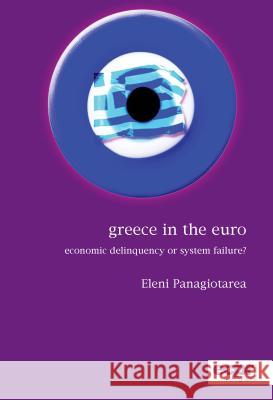Greece in the Euro: Economic Delinquency or System Failure? » książka
Greece in the Euro: Economic Delinquency or System Failure?
ISBN-13: 9781907301537 / Miękka / 2013 / 202 str.
Greece banked on EMU. Entry into the eurozone was its ticket to macroeconomic stability, its modernisation jacket and its gateway to global markets. So how did such a promising start turn to dust so quickly? Was Greece the delinquent eurozone member whose fiscal downfall nearly brought down some of the world's strongest economies? Or was it the first victim of the euro's system failure? An original approach to understanding how national institutions affect economic performance, diluting and disrupting single currency pressures for convergence and adjustment.
Is Greece an economic delinquent or a victim of systemic failure? The question and its answer have wider resonance: the Euro ? a currency without a state ? was always going to be about owning and sharing responsibility in a less than perfect monetary union, in a more than troubled world. Combining historical perspective with up-to-date analysis, and using elite interviews published for the first time, this book foregoes apportioning blame, in favour of delving into the complex forces that turned a sovereign debt crisis into a crisis for the eurozone. In the process, it subjects theoretical insights on rule-following and compliance to fresh empirical testing, while introducing a concept of policy ostrichism. Greece in the Euro: Economic Delinquency or System Falure? contributes to three important debates about the euro area crisis: the new economic governance versus the old approach, the IMF/EU experiment in problem solving and, finally, the democratic ownership of the national economic policy process.The Europeans have engaged in a protracted and often highly uncivilized blame game as the euro crisis moves from one phase to the next. This book examines the interaction between national and systemic failure, with Greece as a test case. It is lucid, well documented and cogently argued. And it pulls no punches.Professor Loukas TsoukalisUniversity of AthensThose who have been puzzled by the unravelling of the political contract that underlay European economic and monetary union will find much of value in this study. Examining the strength of weak institutions, Eleni Panagiotarea shows, through meticulous analysis of the evidence and the use of interviews, how the political commitments involved in the design of monetary union could not be sustained.Professor Albert Weale FBASchool of Public Policy, University College LondonAn informed and balanced account of how Greece and the euro-zone got into this mess. It introduces the reader to the complexities of reforming Greece and to the shallowness of the Ordo-liberal design for the euro.Professor Kevin Featherstone Eleftherios Venizelos Chair in Contemporary Greek StudiesEuropean Institute, London School of Economics











